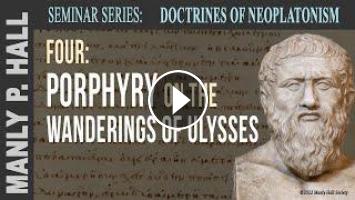This lecture chronicles Homer's tale of "The Odyssey" and the symbolic meanings of the imagery in the drama. Hall interprets this legend in a clear and understandable way that helps a contemporary individual to learn and grow, and apply these lessons to one's own life. The "Odyssey" is actually the journey of the Soul, on a quest to return to the True Home, which is its proper place in the Universe. We are all on that Soul's journey and Mr. Hall's symbolic interpretation of this epic poem serves as a guide to our wanderings and to help us reach the destination on that distant shore.
Manly Hall considered Neoplatonism (~3rd to 7th century C.E.) to be one of the most important philosophical systems that a seeker of wisdom could study. Beginning with Plotinus, this movement brought back the spirit of pre-Socratic thought as well as that of Socrates, Plato and Aristotle. Consciousness was considered as primary and existing before matter - that the thought world proceeded the material realm, and therefore, more important for each of us to explore and experience.
This is the fourth of a five-part seminar series on "Doctrines of Neoplatonism". Part 4 was recorded in Los Angeles on Wednesday, November 2, 1955.
The Doctrines of Neo-Platonism
Instructor: Manly P. Hall - Wednesday Eves. at 8:00
1: Proclus on the Theology of Plato (October 12, 1955)
2: Iamblicus on the Mysteries (October 19, 1955)
3: Plotinus on "The Beautiful" (October 26, 1955)
4: Porphyry on The Wanderings of Ulysses (November 2, 1955)
5: Julian on The Mother of the Gods (November 9, 1955)
#homer #ulysses #manlyphall
©2022 Manly Hall Society
Manly Hall considered Neoplatonism (~3rd to 7th century C.E.) to be one of the most important philosophical systems that a seeker of wisdom could study. Beginning with Plotinus, this movement brought back the spirit of pre-Socratic thought as well as that of Socrates, Plato and Aristotle. Consciousness was considered as primary and existing before matter - that the thought world proceeded the material realm, and therefore, more important for each of us to explore and experience.
This is the fourth of a five-part seminar series on "Doctrines of Neoplatonism". Part 4 was recorded in Los Angeles on Wednesday, November 2, 1955.
The Doctrines of Neo-Platonism
Instructor: Manly P. Hall - Wednesday Eves. at 8:00
1: Proclus on the Theology of Plato (October 12, 1955)
2: Iamblicus on the Mysteries (October 19, 1955)
3: Plotinus on "The Beautiful" (October 26, 1955)
4: Porphyry on The Wanderings of Ulysses (November 2, 1955)
5: Julian on The Mother of the Gods (November 9, 1955)
#homer #ulysses #manlyphall
©2022 Manly Hall Society
- Category
- Manly P. Hall
Be the first to comment





